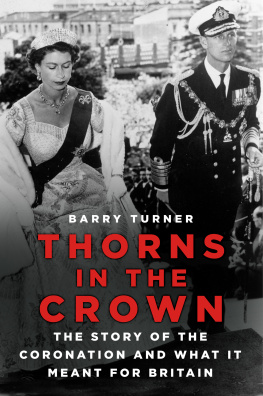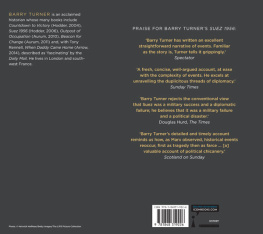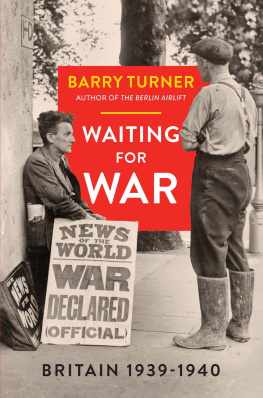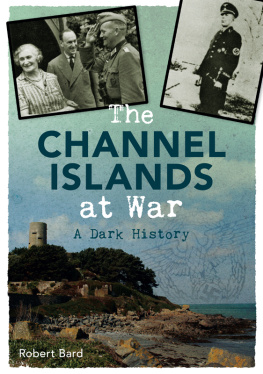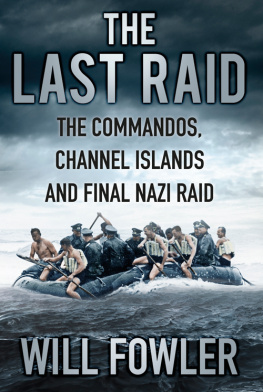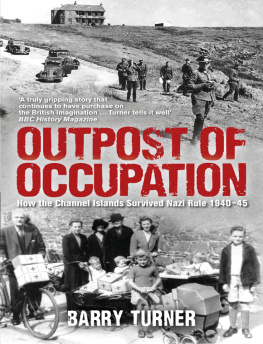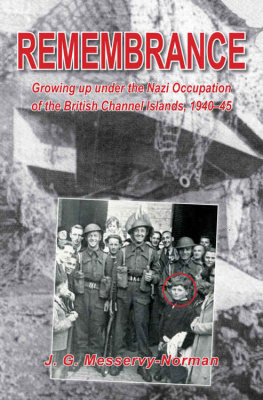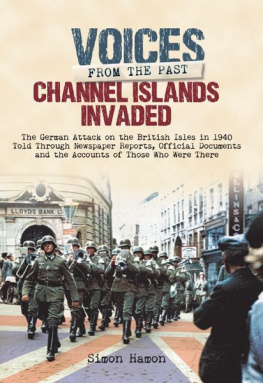E very country has its own take on the fortunes and misfortunes of war. National pride wraps itself in a fabrication which inflates victories and minimises defeats. Britain is no exception. After seventy years, the morale-boosting legends attached to a world war fought and won are still as powerful, if not more powerful, than less palatable aspects of Britains involvement. One such is the deeply ingrained myth of a nation that, come what may, would never have surrendered. Though Nazi rule embraced continental Europe, it could not have happened here. That it did happen in the Channel Islands, the only part of Britain to be occupied by German forces, has long vexed the myth makers.
Confronted by an overwhelming power, islanders accommodated themselves as best they could to an unwelcome reality. It was no easy ride. Deprivation and suffering there was in plenty, more than enough to match experiences on the mainland. For long periods, the ordinary necessities of life food, fuel, clothing were in desperately short supply. More than this, on small islands where there were few secluded spaces the inhabitants had to live for five years under constant surveillance and arbitrary directives, the deadening effects of which should not be underestimated. But the absence of a mass uprising or much in the way of violent resistance offended those, Churchill in particular, who made no concessions to the possibility of defeat.
In the aftermath of the fall of the Third Reich, opinion was divided on the Channel Islands. While the liberation and the fortitude of those who had stayed the course was celebrated, there was in some quarters, notably the intelligence services, a conviction that the islanders had wilfully allowed the Germans to walk all over them. As hitherto unpublished intelligence reports reveal, the lust for retribution, strongest among those who had spent most of the war behind Whitehall desks, encouraged and sustained belief in a traitorous cover-up. This ill-founded view took such hold that even today historians of otherwise impeccable credentials feel obliged to take a swipe at the Quislings who held sway in the Channel Islands a charge repeated in the latest volume of the New Oxford History of England. also takes a harsh view, highlighting the rare cases of blatant collaboration, notably the rounding up, at German behest, of the tiny, fully assimilated Jewish population.
But this is by no means the whole story. At no time did leading islanders accept German authority other than by enforcement. The islands were surrendered without a fight on orders from London, where, in the wake of domino defeats across Europe, demilitarisation seemed the only practical option. Subsequently, while many mistakes were made, most of them, starting with an ill-conceived and poorly managed evacuation, originated with central government. In contrast to other occupied countries, the Channel Islands were denied the arms and agents deemed essential for a grassroots rebellion, surely a critical factor when it comes to judging the islanders wartime behaviour.
Why then are one-sided and condemnatory judgements on the Channel Islands in wartime still common currency? Partly, they reflect a British failure to understand what occupation really means. In recent years, studies of the social and economic responses to arbitrary foreign rule have shown patterns that were remarkably similar across Nazi-dominated Europe. Hating what was happening to them, most people tried as best they could to get on with their lives. Heroes of the resistance were a tiny minority until the near certainty of German defeat gave a fillip to active opposition.
This was certainly true of France, but perhaps a closer comparison is provided by the occupation experiences of Denmark and Norway, small countries which had long since lost any military pretensions. As in the Channel Islands, occupation came as a profound cultural shock to the Nordic people, who found it hard to credit that a neighbouring country should choose to exercise its will by force of arms. But they, along with the rest of mainland Europe, had the advantage, if it could be so called, of living with the early crises caused by Hitlers territorial ambitions. To that extent, they were aware of Nazi Germanys capacity for power politics at the point of a gun.
The Channel Islands, on the other hand, were a society apart, isolated by geography from the big events and more concerned with farm and fishing prices than with the struggle for first place in the European pecking order. The islanders were a hardy people used to managing their own affairs within the tight rules of the nonconformist ethic. Crime was rare; violent crime almost unknown. Their last military encounters had been during the Napoleonic wars. To cope with an enemy at first hand was to enter another dimension.
There were brave individuals in the Channel Islands who risked the concentration camp or the firing squad to fight for basic freedoms. But while their stories are inspirational, equal credit must surely go to the politicians and administrators who tried to work the system in ways that held their societies together while making minimum concessions to the enemy. It was a dangerous game with often grave consequences.
When it was all over, accusations of collaboration were firmly discounted by senior ministers in Churchills government. But Churchill himself was not so sure. Why? Was it because the wartime experience of the Channel Islands failed to live up to his portrayal of a country ready to face extinction rather than submit? Certainly, Churchill made no allowance for the practicalities of living with the enemy. Is it possible that he saw the islands as an embarrassment, a departure from his chosen norm that was best soon forgotten? What cannot be denied is that his refusal to speak out on behalf of the islanders, together with the malign preoccupation of the intelligence services who saw traitors at every turn of their inept investigations, left a legacy of suspicion and recrimination that is still with us. This book is an attempt to clean the slate.
1
E verywhere the flags were flying, but this was no celebration. The improvised banners flapping in a summer breeze were a uniform white and the message they conveyed was the same for every house and farm in Jersey. The Germans were coming and there was absolutely nothing anyone could do about it.
The date was 1 July 1940. It had happened so quickly. Two months earlier Hitlers army had been poised but was yet to strike. In London, there was confident talk of defending the Channel Islands if, and this was judged to be highly improbable, a German invasion was threatened. Then, starting in April, events unfolded with dramatic suddenness. First Denmark and Norway were overrun. Belgium and Holland soon went the same way. On 4 June the last British soldier was lifted from the beaches of Dunkirk and two weeks later, on Monday, 17 June, France finally crumbled before the German military machine. The whole of the coastline of north-west Europe, from north of Norway to the Spanish frontier, was now in German hands.
The shock to the people of Jersey and Guernsey and of their smaller neighbours, Alderney and Sark, was profound. Living as they did closer to France than to England (Jersey is just fifteen miles off the French coast and Alderney even closer), many islanders were more familiar with St Malo, Granville and Cherbourg than Plymouth, Southampton and Bournemouth. Though their first loyalty was to the British crown and had been since 1066, even those who did not have friends and relatives across that narrow strip of water shared Frances pain and humiliation. There was fear too. Gunfire could be heard; the smoke from blazing oil depots was clearly visible. How long would it be before the enemy was at the gate?


